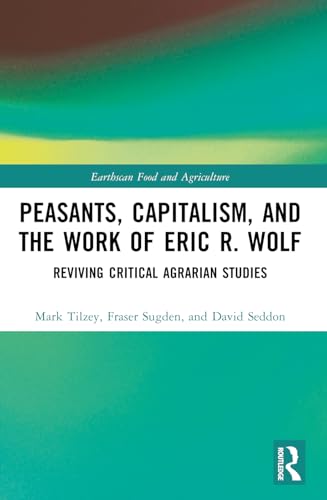
Peasants, Capitalism, and the Work of Eric R. Wolf
Mark Tilzey, Fraser Sugden, David Seddon
Questions & Answers
The book critically evaluates Eric R. Wolf's theoretical approach and methodology, particularly in "Peasant Wars of the Twentieth Century" and "Europe and the People Without History," as highly relevant for understanding agrarian capitalism and its impact on the peasantry. It acknowledges Wolf's historical and political anthropological approach, which emphasizes the peasantry's role in resistance and liberation from oppression. The book finds Wolf's analysis of the "mode of production" concept, particularly in "Europe and the People Without History," useful for understanding the dynamics of capitalist development and the peasantry's position within it. However, the book also suggests that Wolf's analysis could benefit from a more explicit Marxist framework and a deeper exploration of the agrarian question, which involves the class struggle and the peasantry's role in facilitating or obstructing agrarian transitions. Overall, the book considers Wolf's work foundational for understanding the complex relationship between agrarian capitalism and the peasantry.
Class struggle plays a pivotal role in the agrarian question, particularly during transitions to capitalism and beyond. It revolves around the distribution of resources and power, with different classes wielding various resources to influence outcomes. The peasantry, often marginalized, may rely on material resources like land and labor, while also utilizing discursive resources such as cultural practices and social networks. The rural bourgeoisie and petty bourgeoisie may leverage political connections and intellectual influence. In capitalist transitions, the state often acts as a mediator, balancing the interests of different classes. The peasantry's ability to mobilize these resources can either facilitate or obstruct capitalist transitions, potentially leading to alternative modes of production that prioritize social and ecological sustainability.
The book analyzes the development of core-periphery relations in the global political economy by examining the historical rise of capitalism in the global North and its spread to other regions. It highlights the transformation of the peasantry in the core regions, where they were largely proletarianized, contrasting with the survival of the peasantry in the periphery, where they remained connected to land for subsistence. The book argues that the core-periphery structure was created and maintained through imperialism and "combined and uneven development," where the core exploited the periphery for capital accumulation. The peasantry's role is seen as both a source of resistance to capitalist expansion and a potential force for alternative modes of production, especially in the context of the global South. The analysis emphasizes the importance of class struggle, state policies, and the ecological impact of these dynamics on the peasantry's fate.
The 'farmer road' to capitalism, exemplified in the United States, stands out from other agrarian transitions due to its unique characteristics:
- Origins: It emerged from within the settler peasantry, free from feudal constraints, leading to a spontaneous emergence of capitalism from below.
- Class Structure: It involved differentiation within the peasantry, with the rich peasantry becoming capitalist farmers, and the landless becoming wage workers.
- Market Development: It fostered a home market for commodities, stimulating industrial and agricultural development.
- Progressive Development: It led to a more rapid development of productive forces and a larger home market, improving living standards.
In contrast, other transitions like the 'Junker road' (e.g., in Prussia and Japan) were driven by the landlord class, leading to slower development, semi-feudal characteristics, and limited market development. This contrasts with the 'farmer road', which often results in more balanced and endogenous development.
These differences influence outcomes by determining the pace, nature, and inclusiveness of agrarian transformations. The 'farmer road' tends to be more progressive and egalitarian, while other paths can be more exploitative and slower in fostering development.
The book emphasizes the peasantry's crucial role in addressing the politico-ecological crisis by highlighting their commitment to meeting fundamental needs, communal values, and ecological sustainability. It argues that the peasantry's resistance to capitalist exploitation and ecological degradation offers a path to sustainable livelihoods. Potential solutions include:
- Agrarian Reform: Addressing the agrarian question by redistributing land and resources to the peasantry, ensuring access to the means of production and reducing exploitation.
- Agroecology: Promoting sustainable agricultural practices that enhance ecological resilience and reduce dependency on chemical inputs.
- Food Sovereignty: Encouraging local food production and distribution to reduce reliance on global markets and ensure food security.
- Community-Based Organizing: Strengthening local communities to empower peasants and facilitate collective action against ecological and social injustices.